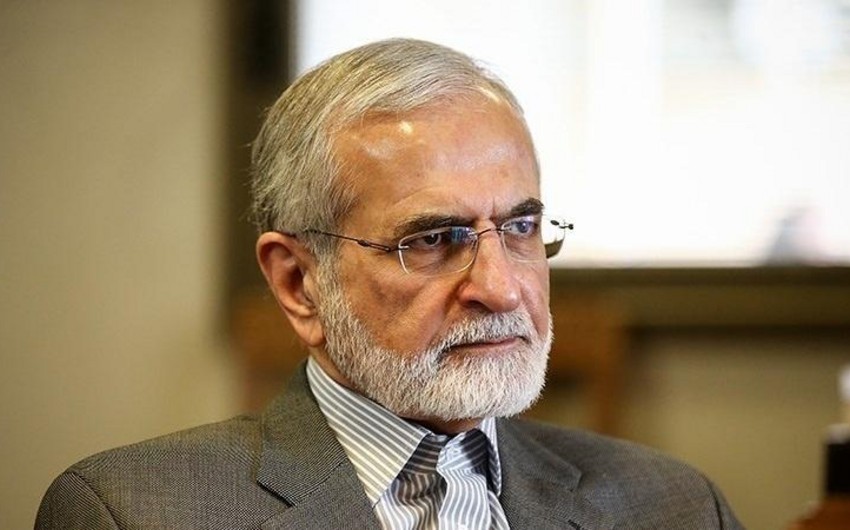An adviser to Iran’s supreme leader has warned that if Israel launches an all-out offensive against Hizbollah, it would risk triggering a regional war in which Tehran and the “axis of resistance” would support the Lebanese militant movement with “all means”, Report informs via The Financial Times.
Kamal Kharrazi, foreign affairs adviser to Ayatollah Ali Khamenei, told the Financial Times that the Islamic Republic was “not interested” in a regional war and urged the US to put pressure on Israel to prevent further escalation.
But asked if Iran would support Hizbollah — its most important and powerful proxy — militarily in the event of a full-blown conflict, Kharrazi said: “All Lebanese people, Arab countries and members of the axis of resistance will support Lebanon against Israel.”
“There would be a chance of expansion of the war to the whole region, in which all countries including Iran would become engaged,” he said in an interview. “In that situation, we would have no choice, but to support Hizbollah by all means.”
He added: “The expansion of war is not in the interest of anyone — not Iran or the US.”
Tensions between Iran, the US and Israel have soared since Hamas’s October 7 attack and Israel’s retaliatory offensive in Gaza, with Iranian-backed militant groups launching attacks against the Jewish state and US soldiers in the region.
Hizbollah has traded almost daily cross-border fire with Israel, Houthi rebels in Yemen have attacked ships in the Red Sea and fired drones and missiles at Israel, and Shia militants in Iraq and Syria have attacked US troops and fired projectiles at Israel.
Iran and Israel also launched tit-for-tat missile attacks against each other in April — marking the first direct Iranian strike against Israel from its own soil. However, both sides sought to de-escalate the tension, with the respective strikes considered calibrated and causing limited damage.
But fears of an all-out Israel-Hizbollah war have intensified in recent weeks amid increasingly bellicose rhetoric from both camps, raising concerns in the West about how Iran would react.
Iran’s mission to the UN on Friday warned of an “obliterating war” if Israel launched an offensive against Hizbollah, saying “all options’‘ were on the table.
Another Iranian official told the FT that Iran would be unlikely to directly target Israel, instead mobilizing the network of Iran-backed militant groups across the region that make up the Axis of Resistance.
The concerns come as Iranians prepare for a new government following the death in May of President Ebrahim Raisi in a helicopter crash. A presidential election run-off is scheduled for Friday after no candidate secured more than 50 percent of the vote in the first round on June 28.
Voters will choose between reformist Masoud Pezeshkian, who wants to re-engage with the West to secure relief from sanctions, including those imposed over Tehran’s nuclear ambitions, and Saeed Jalili, an ideological hardliner hostile to the US.
Kharrazi said that while there would be “some differences” in approach depending on who won, the overall foreign policy strategy was determined by Khamenei and would remain the same.
The election would create the chance for “new openings” between Iran and the West, he said. But to achieve that, western states would need to retreat “from the current policies and engage in negotiations with Iran based on equal footing and mutual respect”.
Kharrazi added. “If they decide to cooperate, we are ready for cooperation.”
The Islamic Republic would be willing to hold indirect negotiations with Washington about Tehran’s nuclear program under a new government, if it would lead to the US rejoining the 2015 accord Iran signed with world powers — known as the JCPOA — he said.
Iran and the West have been locked in a stand-off since former US president Donald Trump unilaterally abandoned the JCPOA in 2018 and imposed waves of sanctions on the republic. The Biden administration sought to revive the accord, but diplomatic efforts collapsed after the West blamed Iran for rejecting a draft proposal to save the deal in August 2022.
The US and European signatories to the JCPOA have since become increasingly concerned about Tehran’s expansion of its nuclear program. Iran has been enriching uranium at 60 percent purity — close to weapons-grade — for more than three years. It now has sufficient fissile material to produce about three nuclear bombs within weeks, experts say.
Senior US and Iranian officials held indirect talks in Oman in February and May to discuss the crisis, as well as regional hostilities.
“We are not for building nuclear weapons,” Kharrazi said, citing a fatwa issued by Khamenei in 2003 banning the development of the arms. But he said that if Iran faced an existential threat, “naturally we [would] have to change our doctrine”.
He added that if the West triggered “snapback” provisions to reimpose UN sanctions lifted when Tehran signed the JCPOA, in response to Iran’s continued expansion of its program, “there would be a severe reaction from Iran in terms of changing its nuclear strategy”.
“Up to now, we have not decided to go further than 60 percent enrichment,” he said. “But we have been trying to expand our experience by using different machines and different set-ups.”
The West has also been angered by Iran’s sale of armed drones to Moscow, which Russia has used in its war in Ukraine.
Kharrazi insisted Iran was neutral in that conflict, saying it sold drones to Russia prior to Moscow’s invasion of its neighbor. When asked about Western concerns that Iran could sell missiles to Moscow, he said: “There have been such accusations, but it is not true.”
However, he said, there was “no obstacle between Iran and Russia for arms deals”, adding that Tehran was in negotiations to buy Russian fighter jets.
“We are due to sign a comprehensive strategic agreement with them in the near future,” Kharrazi said.


 https://static.report.az/photo/5005f39c-ef11-3ac5-b2c0-5dfe1bc2390f.jpg
https://static.report.az/photo/5005f39c-ef11-3ac5-b2c0-5dfe1bc2390f.jpg

